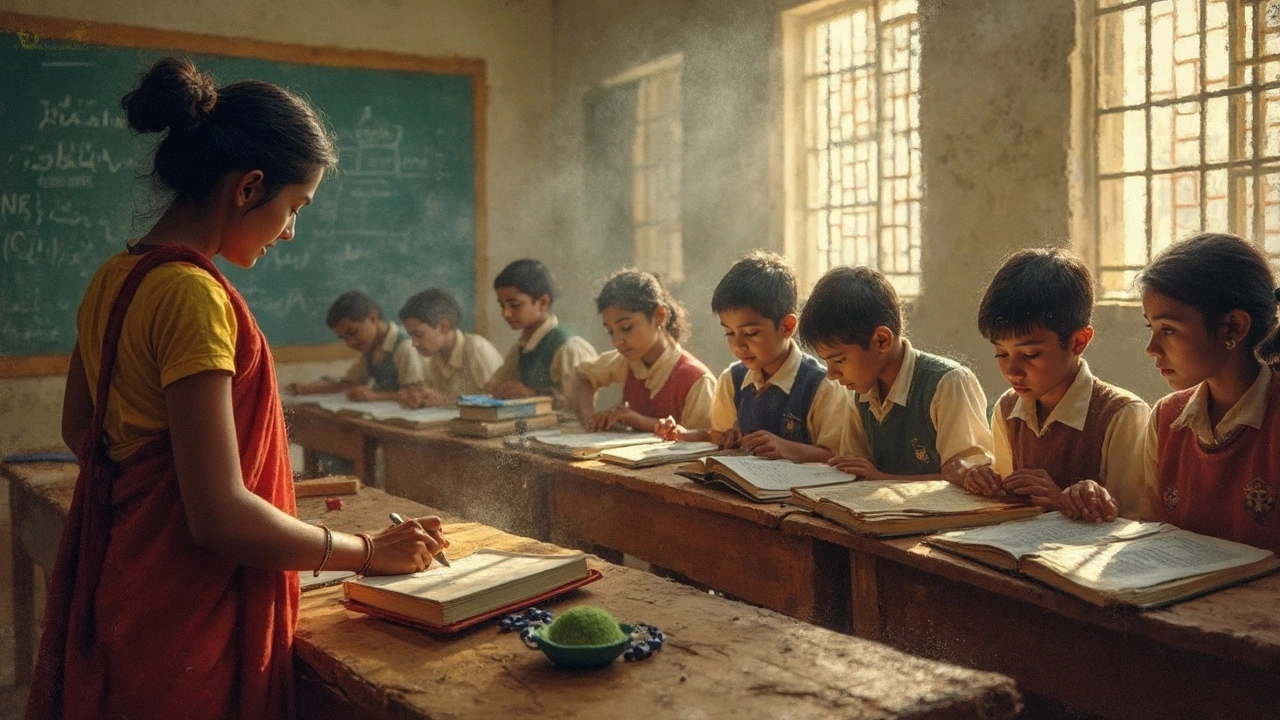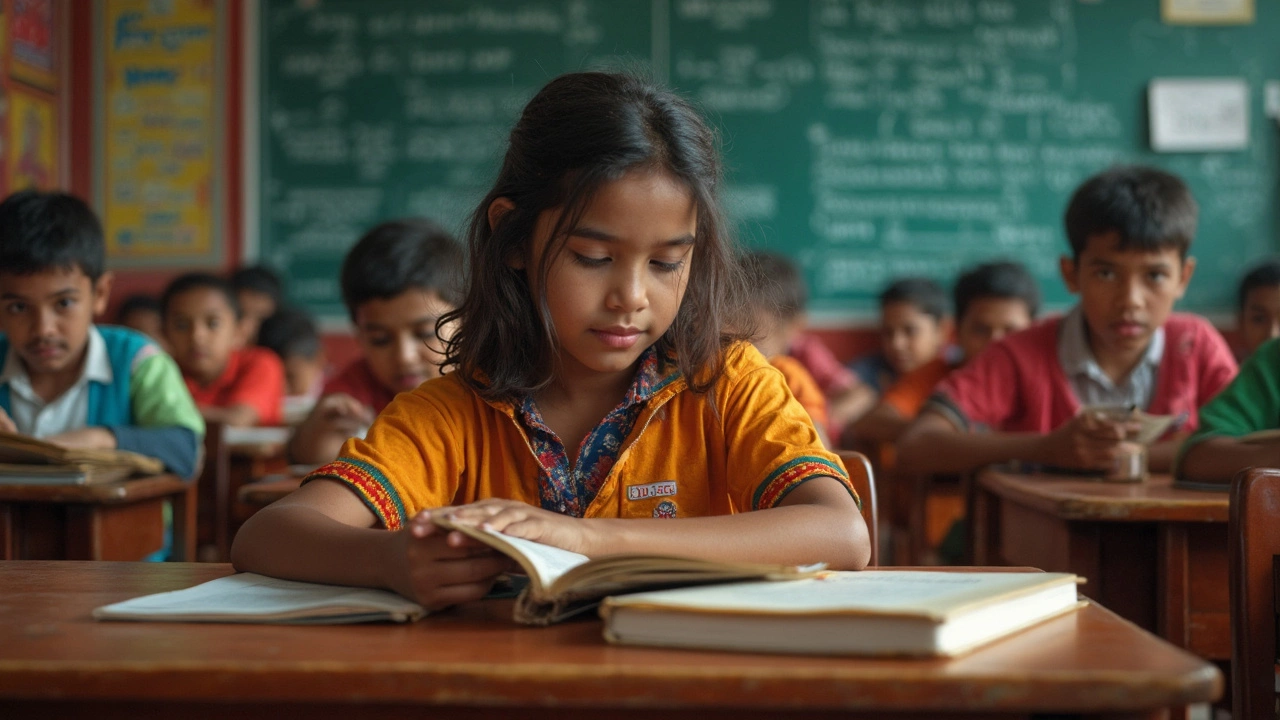Picking the right school board isn't just about textbooks. It can totally change how your school life feels, how exams stress you out, and even what options you have for college. Ask any student slogging through board exams, and you'll hear the same names pop up—CBSE and ICSE—when talk turns to which boards are the toughest in India.
But what actually makes a board 'tough'? Some say it's the mountain of theory. Others point to the pressure of cracking lengthy papers or tackling weekly assignments. If you (or your child) are deciding between boards, it's smart to get real about what you're up against. Let's break down what sets these boards apart, where most students trip up, and how choosing one over the other changes more than just your school uniform.
- Why Board Choice Matters
- Spotlight on CBSE: Structure and Challenges
- Inside ICSE: What Sets It Apart
- CBSE vs. ICSE: Real Differences
- Tips for Surviving Tough Boards
Why Board Choice Matters
Think your school board doesn’t make a big difference? Turns out, it does—sometimes more than you’d guess. The board you pick shapes what you learn, how tough your exams feel, and where you might land for college or jobs later. In India, parents and students talk a lot about which board sets the pace, runs the hardest tests, and lines up best with career options.
The toughest board India debate typically circles around CBSE and ICSE for a reason. Here’s what actually changes when you pick one over the other:
- Exam Style: CBSE goes for straightforward questions and lots of application-based problems. ICSE throws in essays, lots of descriptive answers, and expects you to remember a huge amount of detail.
- Subject Choices: CBSE keeps it simple—more science and maths focus. ICSE covers a broader range—think art, language options, and humanities.
- National vs. International Recognition: CBSE is accepted almost anywhere in India, with its pattern matching most national entrance exams like JEE and NEET. ICSE, on the other hand, gets international brownie points, especially in Commonwealth countries, thanks to its language-rich syllabus.
- Study Load: ICSE piles on chapters and expects long hours. CBSE lets you focus more, especially during higher classes, since it trims topics that don't fit entrance exams.
It’s not just about academics either. The board you choose can impact school fees, your daily schedule, and even how comfortable you feel with the English language (ICSE is strict about English). Wondering if stats back up all this board talk? Here’s a quick look at how CBSE and ICSE stack up together:
| Factor | CBSE | ICSE |
|---|---|---|
| No. of Schools (2024) | 28,573 | 2,341 |
| Exam Pass Rate (2024 - Class 10) | 93.6% | 98.2% |
| Subjects Offered | ~40 | ~60 |
| Language of Instruction | English/Hindi | English only |
So before you dive in, think about what fits your strengths, what matches your dream exams, and where you see yourself after school. Board choice is a lot more than paperwork; it’s a foundation for everything that comes next.
Spotlight on CBSE: Structure and Challenges
The Central Board of Secondary Education (CBSE) runs thousands of schools across India, including top Kendriya Vidyalayas and private giants. Its exam pattern and daily workload shape the academic lives of millions. If you’re thinking about it, you need to understand what you’re signing up for.
CBSE’s main strength is its organized, standardized style. The syllabus sticks closely to the National Curriculum Framework, and you’ll notice subjects like Science and Math lined up with topics seen in major competitive exams like JEE and NEET. That’s why it’s the go-to board for students dreaming of engineering or medical fields.
Let’s break it down:
- Subjects are theory-heavy, especially in Class 11 and 12. You get loads of formulas, principles, and direct questions in the exam.
- Exam pattern uses a lot of objective-type (MCQ) questions since 2021, but you still need strong writing skills for the long answers.
- NCERT books are the main resource—crucial for exam prep, but tough because answers have to match textbook language.
If we look at the pass percentages, you get an idea of how students fare:
| Year | Class 10 Pass % | Class 12 Pass % |
|---|---|---|
| 2022 | 94.4% | 92.7% |
| 2023 | 93.1% | 87.3% |
Despite the high pass rates, don’t get fooled—cracking top scores (think 95% and above) is another story. Marking is strict, and students often say it feels like you’re being graded for every word. Sometimes, even one missing step in a math answer means full marks slip away.
You’ll feel the pressure most in board years (class 10 and 12). There’s a constant countdown to exams, with term tests, practicals, and sample papers on repeat. Board exam dates, admit cards, final marking scheme—everything comes with so much procedure. And with lakhs of students competing for the same seat in college, there’s not much room for error.
Teachers advise sticking to the CBSE syllabus, solving NCERT examples, and practicing sample papers as your best bet. If you’re naturally structured, like lists and routines, you might find CBSE less overwhelming. But if you prefer deeper study or creative answers, you might find it a bit rigid.

Inside ICSE: What Sets It Apart
When people talk about tough school boards, ICSE jumps straight to the top of the list. It's not just because of the massive textbook size—there's a whole system that pushes students to dig deeper into subjects. The toughest board India keyword fits here for a reason.
ICSE stands for Indian Certificate of Secondary Education, run by the Council for the Indian School Certificate Examinations (CISCE). Unlike CBSE's focus on getting you ready for national entrance tests, ICSE puts heavy focus on in-depth subject knowledge, perfect grammar, and lots of project work. English gets a special spotlight—it's not just a subject, it's the language of exams, projects, and communication. If you struggle with language, ICSE can feel brutal.
- Subjects Galore: ICSE students study a broader mix—for example, history, civics, geography, environmental science, plus usually three language papers by class 10.
- Project Work: About 20% of almost every subject's total marks come from internal assessments and projects. These aren't quick fill-in-the-blank assignments; they're real research and reports.
- Exam Length: Papers are known for being long and complex, testing how well you've understood—not just memorized—the material.
Here's a quick look at how ICSE stacks up against CBSE in key academic areas:
| Factor | ICSE | CBSE |
|---|---|---|
| Subjects | 13-15 by Class 10 | 8-10 by Class 10 |
| Project/Practical Weight | 20%-40% in many subjects | 10%-20% in key subjects |
| Exam Language | English only | English, Hindi, regional languages |
| Exam Pattern | Theory + major internal assessments | Mainly theory with minor practicals |
ICSE results pack a punch when it comes to college admissions, especially abroad. Many foreign universities prefer ICSE, saying it matches up with international standards. But the workload is no joke; balancing all those subjects and projects can drain you if you don’t stay organized and proactive.
If you’re aiming for fields that need language skills, like literature, law, or even advertising, ICSE gives you a real leg up. On the flip side, it might feel overwhelming if you want a straight-shot path through science or math-heavy careers, since the workload leaves little breathing room.
CBSE vs. ICSE: Real Differences
When you're comparing the toughest board India has to offer, it really comes down to the nuts and bolts of the CBSE and ICSE systems. These two boards may sound similar, but their approach, subjects, difficulty, and even exam patterns have real differences that can shape a student's entire school journey.
CBSE, short for Central Board of Secondary Education, is India's most popular national board. Its syllabus is standardized across the country, so if your family moves cities a lot, sticking to CBSE can make life easier. It's also tightly linked to most competitive exams like JEE and NEET—so, yeah, a lot of students pick CBSE just for this reason alone.
ICSE, which runs under the Council for the Indian School Certificate Examinations, is known for being broader and putting way more emphasis on in-depth learning and language skills. The pressure here? More subjects, longer answer formats, and a heavy push on English proficiency. If you ever compared CBSE and ICSE English essays, you'd notice ICSE expects a full-on creative story, not just a few paragraphs.
Check out this quick stat table that puts the basics side by side:
| Feature | CBSE | ICSE |
|---|---|---|
| Average Subjects (10th Grade) | 5 | 6 or more (often 7+) |
| Exam Focus | Concepts & application, MCQs, short & long answers | Theory-heavy, descriptive answers, language tests |
| Language Requirement | English + Hindi/Regional | English mandatory, second language + many options |
| Link to Competitive Exams | Direct | Not as direct |
| Assessment Pattern | Year-end boards, some internal marks | Projects, assignments, practicals, year-end boards |
Face it, ICSE throws a wider net with more internal assessments—think science experiments, English projects, and open-ended questions that demand opinions, not just memorization. On the other hand, CBSE's strength is in straight-the-point study that's very targeted for competitive exams. If your aim is admissions in Indian colleges, CBSE's syllabus can line up perfectly with those entrance tests. ICSE, though, pulls ahead if you're eyeing universities abroad, thanks to their rigorous English and wide subject spread.
- If you struggle with memorization but love practical projects or creative writing, ICSE might suit you better.
- Prefer clear exam patterns and exams that blend MCQs with short answers? Then CBSE's format is much more digestible.
Both boards demand a lot, but what makes each board "tough" depends on your strengths and what you want to do after school. Neither guarantees an easier ride—the challenge just looks a bit different on each side.

Tips for Surviving Tough Boards
If you're dealing with the toughest board India has to offer, things can feel overwhelming fast. But some practical strategies really do work, whether you're tackling CBSE or ICSE demands.
- Don’t Copy, Understand: Instead of memorizing, get the hang of why something works. For example, CBSE’s science papers throw a lot of application-based questions now, so just cramming definitions won’t cut it.
- Make Smart Notes: ICSE exams test you on details and concepts stacked across big textbooks. Use bullet points, mind maps, and flashcards. That’s way better than rereading paragraphs over and over.
- Know the Exam Pattern: CBSE’s sample papers hit the official website months before final exams. Practicing them is like dress rehearsal—teachers say students who solve at least 5 to 7 official sample papers do way better, since surprises drop.
- Revise Regularly: Set up a realistic schedule and stick to small, daily reviews. Research from coaching centers shows that 20-minute daily bursts beat weekend cramming marathons for long-term memory.
- Don't Ignore Projects: For ICSE especially, internal assessments and projects add up to a big chunk of your score. Sloppy work here means more stress when you’re tallying marks later.
And if you’re in doubt, talk to seniors or teachers who’ve been through these boards. They usually have hacks for everything from getting those last-minute notes to cracking three-hour papers without running out of steam. Remember, nobody expects perfection—just steady improvement and smart effort.

